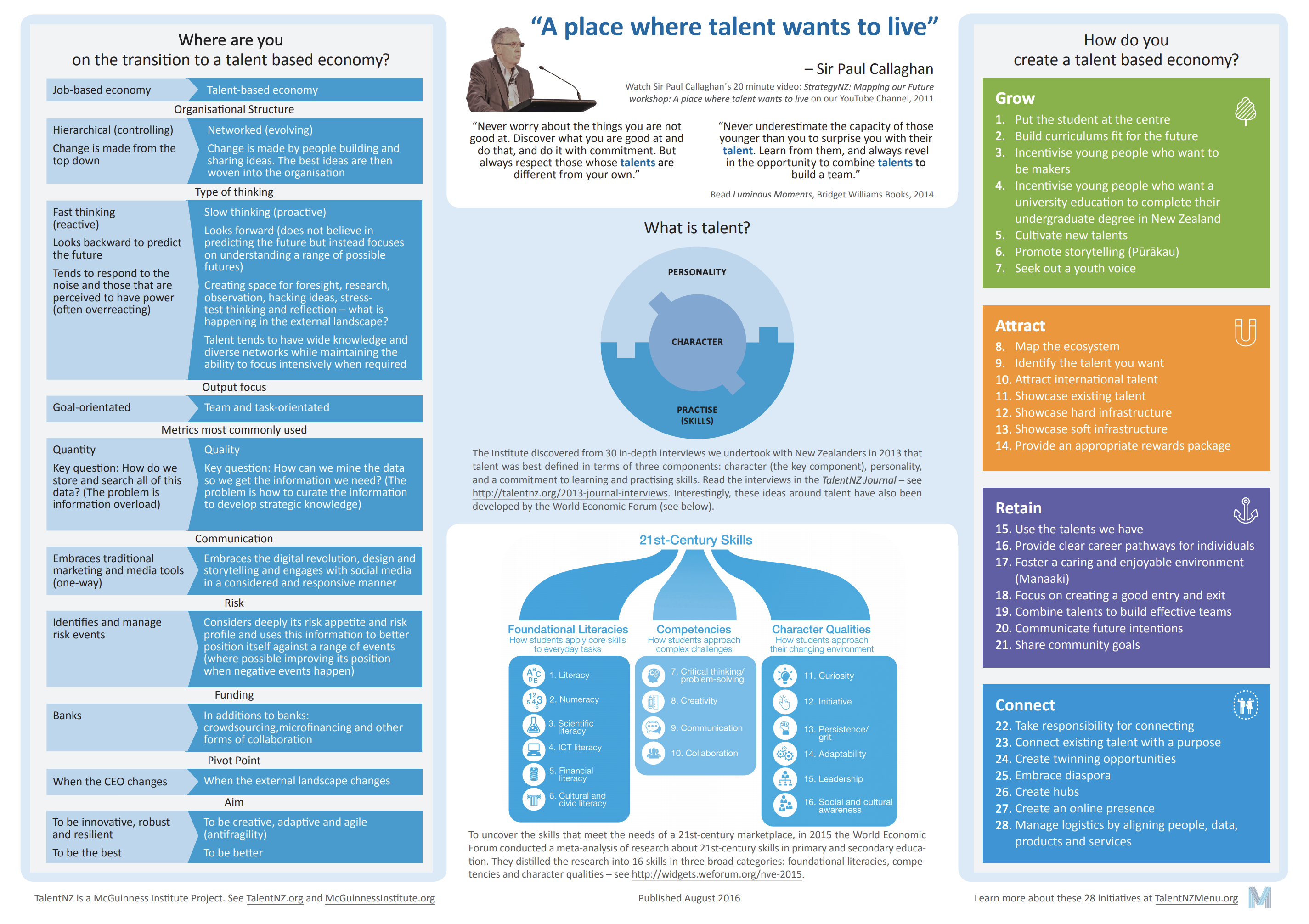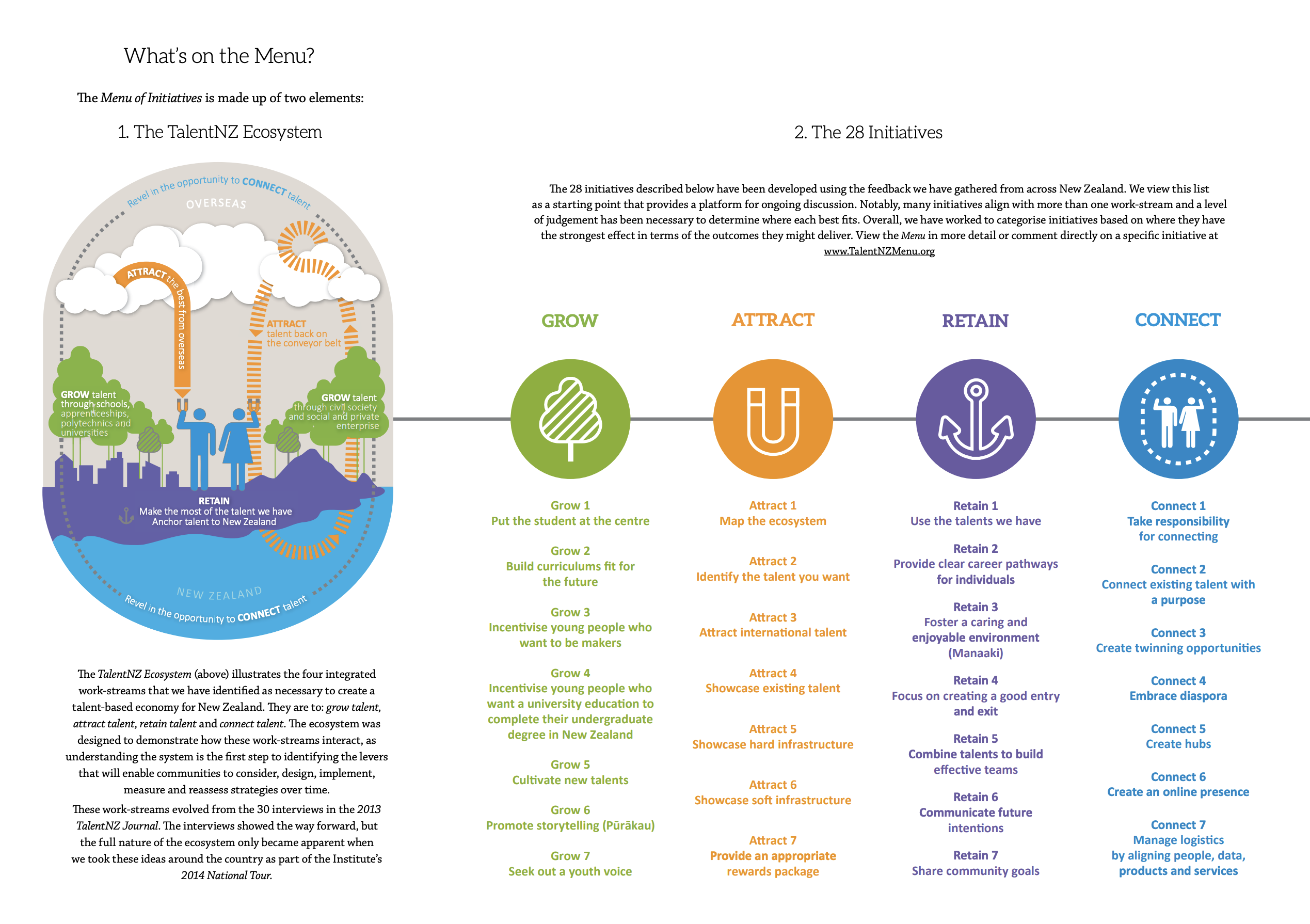Menu of initiatives
Part of the McGuinness Institute’s TalentNZ project
The Menu is designed to invite discussion and reflection over a range of possible initiatives to attract talented individuals to live and work in New Zealand.
TalentNZ builds on Sir Paul Callaghan’s vision that New Zealand be ‘a place where talent wants to live’. We have researched this idea, which he originally advocated in 2011 at the StrategyNZ workshop, and can report back that he was ahead of the curve. He could see the important role that talent would have in New Zealand’s economic and social development, he understood the capacity of young people to surprise us with their talents, and he knew we needed to develop a mindset where we respected those whose talents were different from our own.
Today you cannot open a magazine or newspaper without reading about the role of talent in economic and social development in some way. The countries and communities which learn how to implement Sir Paul’s vision, and deliver an ecosystem that grows, attracts, retains and connects talent have a real opportunity for long term success. Countries and communities that do not actively pursue the creation of dynamic, talent-based economies are more likely to struggle in the long term. Talent attracts talent, dynamic talent ecosystems will create a gravitational pull, and we want that pull to be in New Zealand’s direction. This will require hard work and a mindset where communities build on their unique strengths and weaknesses.
TalentNZ began in 2012, and it has already proved to be quite a journey. To the amazing Kiwis doing extraordinary things who we have met along the way, thank you all for your support, we could not have come this far without you.
The McGuinness Institute will maintain this page to allow more ideas to be gathered and shared. We hope it will provide clarity over how communities might develop cost-effective and innovative solutions to strengthen their gravitational pull and deliver better outcomes to their citizens. To this end we welcome your feedback, your examples and any additional research you think might be useful: please get in touch.
Enjoy, and in particular check out the examples of how Kiwis are working hard today to make New Zealand a place where talent wants to live.

Grow

Attract

Retain

Connect
Below under the four categories; Grow, Attract, Retain and Connect, are seven initiatives that are designed to help talent flourish. We do not expect this to be a complete list, but we hope that they provide a platform for an ongoing discussion. If you have a comment specific to one of the seven initiatives, or would like to share your thoughts, observations and ideas for new initiatives please email us at enquiries@mcguinnessinstitute.org. Together we can provide more clarity over what works and what does not. The below quotes are from interviewees in the 2013 TalentNZ Journal.
Seven initiatives that grow talent
Grow 1. Put the student at the centre
Grow 2. Build curriculums fit for the future
Grow 3. Incentivise young people who want to be makers
Grow 4. Incentivise young people who want a university education to complete their degree in New Zealand
Grow 5. Cultivate new talents
Grow 6. Promote storytelling (Pūrākau)
Grow 7. Seek out a youth voice
– Jim Flynn
– Tim Nixon
– Francis Valintine
Seven initiatives that attract talent
Attract 1. Map the ecosystem
Attract 2. Identify the talent you want
Attract 3. Attract international talent
Attract 4. Showcase existing talent
Attract 5. Showcase hard infrastructure
Attract 6. Showcase soft infrastructure
Attract 7. Provide an appropriate rewards package
– Andrew Coy
– Rod Drury
Seven initiatives that retain talent
Retain 2. Provide clear career pathways for individuals
Retain 3. Foster a caring and enjoyable environment (Manaaki)
Retain 4. Focus on creating a good entry and exit
Retain 5. Combine talents to build effective teams
Retain 6. Communicate future intentions
Retain 7. Share community goals
– Mike (MOD) O’Donnell
– Rachel Carrell
– Rik Athorne
Seven initiatives that connect talent
Connect 2. Connect existing talent with a purpose
Connect 3. Create twinning opportunities
Connect 4. Embrace diaspora
Connect 5. Create hubs
Connect 6. Create an online presence
Connect 7. Manage logistics by aligning people, data, products and services
– Tim Bennett
– Graeme Wong
– Kaila Colbin
Publications & resources
Videos
The Menu of Initiatives launch was held in Wellington on 11 June 2014 and formed part of the 2014 TalentNZ National Tour. The event was filmed and you can watch the speakers discuss different initiatives from the Menu of Initiatives below and also on our YouTube channel.
Sam Morgan speaks about The Talent Thing
Graeme Wong speaks about building a curriculum fit for the future (Grow 2)
Hayden Glass speaks about mapping the ecosystem (Attract 1)
Colin Lynch speaks about identifying the talent you want (Attract 2)
Raf Manji speaks about attracting international talent (Attract 3)
Andrew Coy speaks about showcasing soft infrastructure (Attract 6)
Infographics
‘A place where talent wants to live’ Infographic
TalentNZ Menu of Initiatives Infographic
FAQ
What is TalentNZ?
TalentNZ is a McGuinness Institute project designed to facilitate a structured discussion on how to make New Zealand’s talent-based economy flourish. Since starting in 2012, the Institute has produced multiple outputs, which can be viewed on the TalentNZ research project page.The four work streams of TalentNZ (grow, attract, retain and connect) evolved from the 30 interviews that became the 2013 TalentNZ Journal. The interviews informed our next steps, but it was during the TalentNZ 2014 National Tour that the unique nature of each community’s Ecosystem became apparent. Each community has their own strengths, weaknesses, opportunities and threats. They were all actively seeking initiatives that might help their current talent-ecosystem flourish. The Menu of Initiatives aims to provide a platform for a deeper discussion within communities.
Where did the idea of TalentNZ come from?
In March 2011 the Institute had the honour of having Sir Paul Callaghan as the keynote speaker at its first major workshop, StrategyNZ. In his 20-minute presentation, Sir Paul expressed his belief that a focus on talent was crucial for New Zealand’s future. The TalentNZ project is the Institute’s response to Sir Paul’s idea of building a talent-based economy for New Zealand.
What does talent mean?
Each of us has a range of talents. However, not everyone is fully aware of what these talents might be, how they might be developed or how we might connect with other people interested in similar outcomes. In 2013 we undertook a great deal of research to determine what was meant by talent, and concluded that there was not a single definition. From the Institute’s perspective, ‘talent is a mixture of personality, character and focused practice (which leads to skills) but most importantly we believe that character is key’. This is the first of our seven assumptions.
What are the seven assumptions?
The seven assumptions set the scope and purpose for the project and were developed from our initial research in 2012. They were the starting point for the 2013 TalentNZ Journal, and have continued to guide our thinking as we receive feedback and develop greater clarity over the work programme going forward. The seven assumptions were stress-tested in 2016 during the May TalentNZ round table discussion and were found to still be relevant as the foundation for the TalentNZ project.
What is the Menu of Initiatives?
The Menu of Initiatives focuses on how best to identify and communicate the tools for councils so that they can design their own unique strategy for creating a talent-based economy. Our focus was on how best to identify and communicate the tools that work. We recognise that each community has its own character, personality and skill set. The Menu is designed like a menu you are given at a restaurant. In the same way that one cannot eat every item on a restaurant menu, nor can a community implement every initiative on the Menu of Initiatives. Councillors and communities will therefore need to discuss, research, try out and reflect on which initiatives might work best for them.


